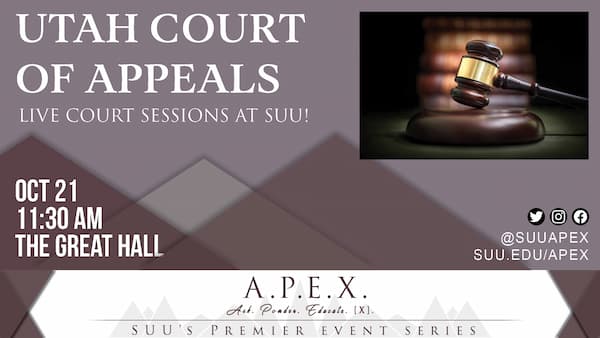
A.P.E.X. events are proud to once again host the Utah Court of Appeals to hear two cases live on campus!
We are privileged to be joined by:
Judge Gregory K. Orme, who was appointed to the Utah Court of Appeals by Gov. Norman H. Bangerter in January 1987, when the court was first established. He has served on the court for over thirty years and is the court's Presiding Judge.
Associate Presiding Judge Jill M. Pohlman. Judge Jill M. Pohlman was appointed to the Utah Court of Appeals in May 2016 by Governor Gary Herbert. Judge Pohlman graduated Magna Cum Laude from the University of Utah in 1993, and received her Juris Doctorate from the S.J. Quinney College of Law at the University of Utah in 1996.
And Judge Ryan D. Tenney, who was appointed to the Utah Court of Appeals in June 2021 by Governor Spencer J. Cox. Judge Tenney graduated from the University of Utah in 2000 and BYU Law School in 2003, both with honors.
Reflection
On October 21 SUU’s APEX event series hosted the “Utah Court of Appeals, Live Court Sessions.” Due to Covid, the event occurred over Zoom, but the APEX audience was able to watch it all together in the Great Hall.
All in attendance were able to sit in on a live and real court case. The case, which was being decided on, was that of Alan Grover.
The meaning for the case goes as follows, “Grover stole a truck, which he then crashed into a trailer. Grover then stole another truck, which he crashed into a nearby field. Police officers tried to arrest Grover, but he would not leave the truck.”
“An officer sent a police service dog after Grover, and Grover shot the dog. The officers then shot at Grover, who was hit about nineteen times. Based on this incident, Grover pled guilty to several crimes. The sentencing judge relied on a presentence report to decide that Grover should serve multiple prison terms.”
The Presiding Judge was Greg Orme. He was accompanied by Judge Ryan Tenney and Judge Jill Pohlman.
Grover was not present at this hearing. His attorney was Nick Turner who expressed what Grover wants. Turner explains that Grover “Is very concerned that these inconsistencies, these inaccuracies [of this case], are going to follow him throughout his life. Whether it be through the system or throughout his life in general.”
State, who Grover was going against, was Jeff Gray. Gray expressed that “It is clear that you are not entitled to hybrid representation and the court is not required to sit through all the pro-say filings of a defendant that is also represented by counsel.”
Tenney declared that this defendant could be “Forever bedeviled by inaccurate PSI.”
Taking a recess, the counsel then participated in a Q and A with the APEX audience. After being questioned about what happens next in this process, Orme declared, “three judges will share thoughts about how they think this case should be resolved.”
With one final question about personal bias, Judge Tenney declared “I was representing a client when I worked for the state, and I was representing the client when I worked for the United States, I had a job to do. I took an oath. The oath contemplates that I will apply the law fairly and neutrally. I am doing my best to do that. One way to not have bias is to surround yourself with other people who can check your personal impulses. ”
The event ended after the Q and A and the court case continued without the APEX audience. The opinions and conclusion of the case will be recorded and out within a couple weeks to a couple months, depending.
Podcast
Video
Case Hearing #1- State v. Grover, case no. 20200187-CA - Grover stole a truck, which he crashed into a trailer. Grover then stole another truck, which he crashed into a field. Police officers tried to arrest Grover, but he would not leave the truck. An officer sent a police service dog after Grover, and Grover shot the dog. The officers then shot at Grover, who was hit about nineteen times. Based on this incident, Grover pled guilty to several crimes. The sentencing judge relied on a presentence report (sometimes called a PSI) to decide that Grover should serve multiple prison terms.
Case Hearing #2 - State v. Redden, 20200700 - Joel Redden committed two domestic violence offenses in October 2019 and the court entered judgment on those convictions in January 2020. In the present case, Redden was charged with violating a protective order in October 2019. Later, the State sought to amend the information to add new charges for violating a protective order, enhanced from class A misdemeanors to third degree felonies based on the domestic violence enhancement statute. Redden opposed the enhancement, arguing that the new crimes had to be committed within ten years after his January 2020 convictions.
















